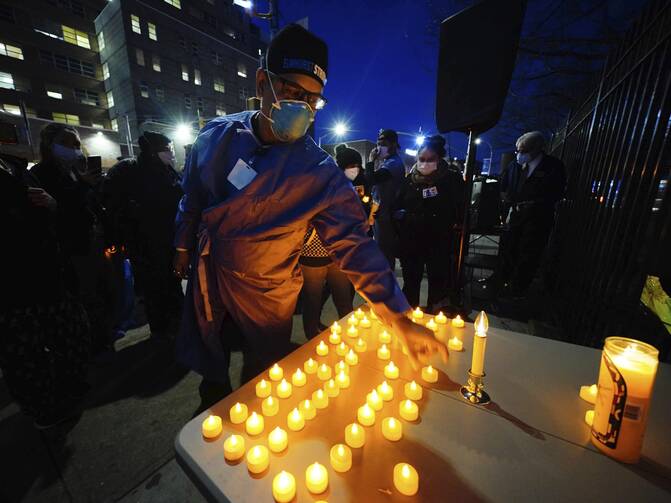We have all heard that the unwelcome guest that is Covid-19 will likely be with us until there is an effective vaccine. What I don’t quite understand is why we seem to be giving it the run of the house.
Other countries with similar health resources have effectively suppressed the first wave of the virus. In the United States we have flattened the curve overall (though the number of infections in some states is still rising), which so far has kept our hospitals from being overwhelmed, and that was no small feat. But those first months of aggressive social distancing were also meant to give us time to figure out our strategy for the next round. Other countries have been building an infrastructure that will allow them to respond more quickly and effectively to a second wave. In the United States, most state governments have increased testing capacity and some are training contact tracers, but overall we have failed to prepare for what may come next.
An economic slowdown could have been justified if we had capitalized on the time it bought us. Unfortunately, we used that time to sow new and unnecessary divisions.
As the false debate between economic health and public health raged on (in April, one member of Congress called Covid deaths “the lesser of two evils” compared with an economic slowdown), we effectively gave ourselves the worst of both worlds. A temporary economic slowdown could have been justified if we had capitalized on the time it bought us. Unfortunately, we used that time to sow new and unnecessary divisions.
In the coming months, we risk our response to Covid taking on the characteristics of our response to gun violence. Regardless of one’s position on guns, there is simply no denying that we in the United States experience more death and disability due to guns than any other industrialized economy (12 per 100,000 on an annual basis, combining suicide and homicide, or about 10 times the rate in other high-income nations). The same disparity may soon be true of Covid. Early in the pandemic, other countries including the United Kingdom, Spain and Italy experienced high mortality rates, but the United States may become the only industrialized economy that sustains such death rates without ever fully suppressing the first wave of infections.
We have a choice between manageable changes to our social lives and sustained levels of hospitalization and death because of this virus.
As we mourn those lost to Covid, we should consider what we will consider the “new normal.” We have a choice between manageable changes to our social lives and sustained levels of hospitalization and death because of this virus. Most countries have chosen the former. But we are dangerously close to collectively accepting the latter, where we will normalize deaths that other countries will act to prevent—and lie to ourselves that nothing can be done.
Public policy, just like our personal lives, is about balancing competing goods. Yet if we can’t find a balance when the stakes are low, doing so when the stakes are high is quite unlikely. For example, if we step back from the hyper-political nature of it, perhaps we can all admit that wearing a mask in an indoor public space is a fairly low-stakes request. (In fact, 68 percent of Americans believe it should be mandatory, at least in indoor public spaces.) But the stakes get admittedly higher when we think about, for example, reopening nursing homes to visitors. We want to ensure that residents do not suffer from loneliness and isolation, but we must also protect them from exposure to Covid. Nursing homes, like the schools we may be sending kids to this fall, are spaces that require broadly shared social expectations to function well.
It feels like a fool’s errand to mention gun violence and expect a civil discussion, and talking about Covid is beginning to take on that same hue.
The factors that contribute to social divisions on guns now complicate our response to Covid. Our media, especially social media, thrive on and encourage confusion and misinformation. We have a notion of rights that is radically individualistic and divorced from the common good. There is the belief that freedom is about noninterference in individual actions more than about ensuring people live in conditions that offer real choices in how to live well. These and other factors contribute to the similarities between guns and Covid, but with Covid we can still avoid mistakes.
Above all, we must resist the temptation to view everything through the lens of political ideology. Indeed, it feels like a fool’s errand to mention gun violence and expect a civil discussion, and talking about Covid is beginning to take on that same hue. Big problems require broad support, and that is not possible if we accept the framing of Covid matters by those who benefit from dividing us.
If Covid required only a technological solution, the United States would likely be leading the way. But we must realize that some problems can best be addressed with social or cultural changes. Until we have an effective treatment or a vaccine, we need to build consensus on the small, reasonable changes to our behaviors for which we can all be held accountable.
It is still possible that we will not normalize Covid in the same way we have with other preventable harms like gun violence. But we must all insist, out of a place of love, that this is our home and it is a place where unnecessary death should never be normal. Doing so with Covid would give us proof that important social change is still possible, offering hope for other issues that require similar solutions.
[Explore all of America’s in-depth coverage of the coronavirus pandemic]











